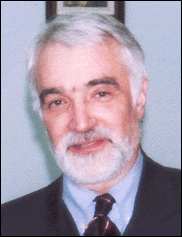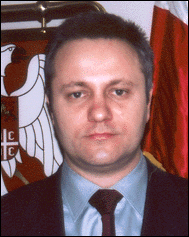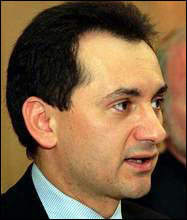 REFORMS & PRIVATIZATION REFORMS & PRIVATIZATION |
 A challenging agenda A challenging agenda |
The citizens who largely supported the Democratic Opposition of Serbia (DOS) wanted fast changes and visible improvement in everyday life. DOS electoral campaign was mostly focused on comprehensive reforms, and promised to citizens, fast, painful but serious changes within the system from the top to the bottom. DOS candidates in the elections signed an "Agreement With Serbia" and pledged that they would inaugurate democratic changes in the country, help to lift the sanctions, settle relations between Serbia and Montenegro in a democratic manner and set up an honest, competent and responsible government. "We are obliged to fulfill our promises, and the citizens are obliged to dismiss us if that does not happen", DOS candidates declared.

The task was challenging. The heritage that Milosevic's regime left to reformers was scary. GDP per capita fell from US $3250 in 1990 to below $900 in 1999. Industrial production was on one third of its pre sanction level, while average salary was about US$50. The gray economy accounted for at least 30 percent of GDP.

The program of economic and constitutional / legal reforms was drawn up for DOS coalition by the G17 Plus Group of Independent Experts led by Federal Deputy Prime Minister Miroljub Labus, Central Bank Governor Mladjan Dinkic, and Serbian Minister for Finance Bozidar Djelic. A year and a half after October 5th 2000, DOS leaders fulfilled a considerable part of their promises. According to Mr. Djelic, once strict discipline in public spending was introduced, the next step was to significantly open the economy internally and externally. Internally, most of the steps were already taken: During the previous regime about 60% of the prices were held under tight government control, and today just few items are still under price control. The electricity price has been increased for 150% and it will be increased for about 40% each year with the goal to reach 4 to 5 cents per KWH. "We needed to raise prices even further, but the impoverished population cannot afford higher prices. So we are quite unpopular with our customers yet still we lack enough money for sufficient investment", says Mr. Goran Novakovic Serbian Minister for Energy and Mining, adding that these prices are still low compared to other neighboring countries.

However, all opinion polls show that in spite of some unpopular measures, reformers have a strong support of public opinion. Mr. Labus and Mr. Dinkic are on the second and third place of the list of most popular political figures right after Mr. Kostunica. The same goes for Mr. Djelic. In spite of tough tax reforms, he is one of the most admired figures among the expert part of the government. Serbian Prime Minister Djindjic, who deliberately decided to put his political position at risk and take responsibility for all bitter pills of reforms, did a good job. The reputation of his Democratic Party and himself is slowly but steadily growing.
Their success in reforms, high professional reputation, and personal integrity, persuaded a lot of young and successful Serbian businessman, economic and IT experts, who worked mainly in US and Canada, to leave their high paid posts and to join forces with the Government. "Our human capital and capacity is more than average. Having this kind of people brings back the credibility in companies, workers can see some dynamic changes and also foreign investors have more trust", says Mr. Djelic, who was himself a partner in McKinsey's Paris headquarters before he joined the government. Mr. Djelic was also involved in the Polish, Romanian and Russian reform processes.
Reformers are equally popular among the leading figures in international financial institutions. "Ministers of Yugoslavia stood up, gave brilliant performances and showed full understanding of the complexity of the economic problem facing them. Donors came rushing in and pledged enormous support for Yugoslavia," recalled Mr. Rory O'Sullivan, chief of the World Bank mission in the FRY, after the Donor's conference in Brussels, last June, where donors pledged US 1.2 billion dollars for Serbia and Montenegro. But Serbia clearly said that it doesn't want to live on donations, and that instead it is fully committed to design preconditions to bring foreign investments.
On the external side Serbia abandoned all import licenses and reduced average customs from 15% to less than 10%. Serbian authorities believe that WTO membership is a realistic and objective goal. "We expect to open official negotiations in April 2002. The process will be speeded. At the same time we are in a stabilization and association process with the EU", says Mr. Labus.

| As for the legal side of the private capital, the Ministry of International Economic Relations, headed by Mr. Goran Pitic, joined forces with other ministries to establish new sets of laws. "Our main priority is to establish the law on foreign investments, new laws on concessions, international commercial registration, security and transactions, company law and bankruptcy law. We are either revising the old ones or bringing in the new ones, all for the sake of adapting them to the level of the European Community", says Mr. Pitic.
"The draft law on foreign investments, which will be adopted very soon, guarantees rights for foreign investors which include the freedom of foreign investment and national treatment. That will mean de facto that the foreign investor has the same position, rights and obligations as a domestic economic entity", says Ms. Jelena Petrovic, special legal advisor in Mr. Pitic's ministry, who drafted the Law. The law guarantees legal security, which means protection from expropriation, nationalization and denationalization, as well as similar state measures, free conversion of the domestic currency into a foreign currency, the freedom of payment in international business relations, the freedom to keep books in line with international standards and the right to transfer profits abroad, as well as priority in the application of international and bilateral agreements when they represent a more favorable solution for the investor. "The largest novelty in relation to the existing law is that foreign investment is restricted only in regard to the sale and production of weapons. Compared to the currently valid solution, restrictions on the foreign investor's participation in telecommunications and the media have been lifted", underlines Ms. Petrovic.
The Serbian ministry of foreign economic relations has also drafted the law on concessions, which introduces several changes in relation to the existing text. The new Bill expands the number of business activities for which it is possible to grant concessions. The maximal duration of a concession is extended from 30 to 50 years. The procedure of a public auction has been replaced with the procedure of an open tender.
New laws are not the only things that Serbia has to offer to foreign investors. The unique advantage of Serbia is the heritage that the country kept from Tito's era. Tito was the communist leader and President of former Yugoslavia, who introduced a specific economic system, which can't be compared with any other communist country. Due to the relatively liberal era of communism - in contrasts of all others countries under the former Soviet Union - Serbia kept the mentality of 40 years market industry development, an industrialized population, and a fairly developed consumer mentality. This also has a role in the implementation speed of reforms and the strong public acceptance of all measures, which were taken to bring Serbia closer to the EU gate.
"The task is obviously challenging and the vision is of course Europe. How long it is going to take us to reach European standards is very difficult to answer, but we hope to meet them by the year 2010", says Mr. Pitic. But the first landmark should be 2004. It is set as a deadline for Serbia to officially apply as a candidate for EU membership.
When they have to underline the advantages of Serbia, many potential foreign investors value the high educated working class, the good understanding of market economy shown by the managerial structures in leading Serbian companies, and the knowledge of the EU market. Companies from these countries as well as from the US are expected to become major strategic partners of Serbia in an ongoing privatization process, which has to be finished in the next four years.
The main objectives of Serbia's government, concerning privatization, are efficiency and a clear ownership structure. In four years time Serbia plans to have only state and private ownership. "We have to have a public, transparent and technically simple privatization", says Serbian minister for privatization Aleksandar Vlahovic.
There are two major techniques of privatization - the tender and the cash auction and three different routes. The first one is the privatization of state-owned assets. The other group will imply the privatization of large enterprises. The third group falls within the so-called 'autonomous privatization', which means that the initiative would be delegated on the company level. In the case of the first and second group, privatization will be managed by the governmental Agency for Privatization. The state will directly manage the privatization process. The third group of companies will have cash auctions organized by the Belgrade Stock Exchange.

Apart from cash auctions for small and medium sized companies, General Manager of BSE, Mr. Zoran Jeremic believes that a lot of successful Serbian companies would soon be listed at the stock exchange. "We established cooperation with different countries, which we expect to be the most important investors. We have already established cooperation with Greece and Austria, and in the near future we are going to do the same with Germany and stock exchanges from the Balkan region", says Mr. Jeremic who points out transparency and confidence as the anchor stones of the BSE future success.
There are over 60 companies undergoing procedure, while over 500 companies are expected to be in privatization procedure during spring. "Serbia has opted for an intensive privatization process. We have no intention of playing around and we truly want to carry out privatization in four years' time," said to the local press Mr. Vladimir Cupic, director of the Republican Privatization Agency.
The first major privatization of three Serbian cement plants happened on the late December 2001. The cement plants were sold to the French Lafarge Company, Swiss Holcim and the Greek Titan Cement Company. The Serbian Budget received USD 138.9 million in revenue from the three cement plants. The process has just begun: the next 16 companies will enter the selling phase in June 2002, and the Government plans to collect US 220 million from these privatization proceedings. |

